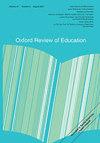故事的力量:马拉维农村的口述故事、学校教育和认知论
IF 2.1
3区 教育学
Q1 EDUCATION & EDUCATIONAL RESEARCH
引用次数: 2
摘要
摘要在本文中,土著和地方对儿童讲故事作用的理解(nthanu)与马拉维正规教育框架中对儿童故事的说教理解进行了对比;深深纠缠在殖民地和(后)殖民历史中的框架。对于大多数居住在马拉维北部湖岸农村社区的讲奇通加语的人来说,nthanu构成了可以被视为“教育”的重要组成部分——作为构建社会自我的核心组成部分,这些口头故事在年轻人的认识论形成中发挥着关键作用。这种讲故事的方式被正规学校系统视为边缘化。通过厚厚的民族志材料,本文展示了汤加民族语言群体的成员如何理解儿童讲故事的作用,即创造作为人、生活在这个世界上意味着什么的本体论概念,以及被视为过上美好生活所必需的人的社会性。在考察村民对故事消失的恐惧时,本文发现了在正规学校中以识字为导向的故事使用与故事在当地学习模式中的社会本体论重要性之间的紧张关系。本文章由计算机程序翻译,如有差异,请以英文原文为准。
The power of stories: oral storytelling, schooling and onto-epistemologies in rural Malawi
ABSTRACT In this paper, Indigenous and local understandings of the role of storytelling for children (nthanu) are contrasted with the didactic understandings of children’s stories that permeate the formal education frameworks of Malawi; frameworks which are deeply entangled in a colonial and (post)colonial history. For Chitonga speakers, the majority of whom live in rural communities along the northern lakeshore of Malawi, nthanu form a crucial part of what might be considered ‘education’ – as core components in the construction of the social-self, these oral stories play a critical role in the onto-epistemological formation of the young person. This storytelling is seen as marginalised by formal school systems. Through thick ethnographic material, the paper shows how people who are part of the ethno-linguistic group of the Tonga understand the role of story-telling for children as creating ontological notions of what it means to be human, to live in this world, and the sociality of being human that is seen as necessary for living a good life. In an examination of villagers’ fears about the disappearance of their stories, the paper locates the tensions between the literacy-oriented use of stories in formal schooling and the socio-ontological importance ascribed to stories in local learning modalities.
求助全文
通过发布文献求助,成功后即可免费获取论文全文。
去求助
来源期刊

Oxford Review of Education
EDUCATION & EDUCATIONAL RESEARCH-
CiteScore
5.20
自引率
0.00%
发文量
39
期刊介绍:
The Oxford Review of Education is a well established journal with an extensive international readership. It is committed to deploying the resources of a wide range of academic disciplines in the service of educational scholarship, and the Editors welcome articles reporting significant new research as well as contributions of a more analytic or reflective nature. The membership of the editorial board reflects these emphases, which have remained characteristic of the Review since its foundation. The Review seeks to preserve the highest standards of professional scholarship in education, while also seeking to publish articles which will be of interest and utility to a wider public, including policy makers.
 求助内容:
求助内容: 应助结果提醒方式:
应助结果提醒方式:


